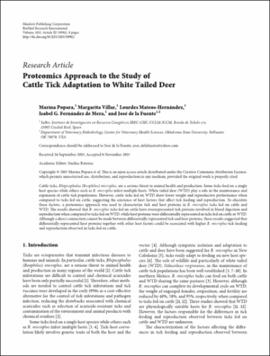| dc.contributor.author | Popara, Marina | |
| dc.contributor.author | Villar, Margarita | |
| dc.contributor.author | Mateos-Hernandez, Lourdes | |
| dc.contributor.author | Fernandez de Mera, Isabel G. | |
| dc.contributor.author | de la Fuente, Jose | |
| dc.date.accessioned | 2018-09-21T17:51:30Z | |
| dc.date.available | 2018-09-21T17:51:30Z | |
| dc.date.issued | 2013 | |
| dc.identifier | oksd_popara_proteomicsappro_2013-01-01 | |
| dc.identifier.citation | Popara, M., Villar, M., Mateos-Hernandez, L., Fernandez de Mera, I. G., & de la Fuente, J. (2013). Proteomics approach to the study of cattle tick adaptation to white tailed deer. BioMed Research International, 2013, Article 319812. https://doi.org/10.1155/2013/319812 | |
| dc.identifier.uri | https://hdl.handle.net/11244/301754 | |
| dc.description.abstract | Cattle ticks, Rhipicephalus (Boophilus) microplus, are a serious threat to animal health and production. Some ticks feed on a single host species while others such as R. microplus infest multiple hosts. White tailed deer (WTD) play a role in the maintenance and expansion of cattle tick populations. However, cattle ticks fed on WTD show lower weight and reproductive performance when compared to ticks fed on cattle, suggesting the existence of host factors that affect tick feeding and reproduction. To elucidate these factors, a proteomics approach was used to characterize tick and host proteins in R. microplus ticks fed on cattle and WTD. The results showed that R. microplus ticks fed on cattle have overrepresented tick proteins involved in blood digestion and reproduction when compared to ticks fed on WTD, while host proteins were differentially represented in ticks fed on cattle or WTD. Although a direct connection cannot be made between differentially represented tick and host proteins, these results suggested that differentially represented host proteins together with other host factors could be associated with higher R. microplus tick feeding and reproduction observed in ticks fed on cattle. | |
| dc.format | application/pdf | |
| dc.language | en_US | |
| dc.publisher | Hindawi Publishing Corporation | |
| dc.rights | This material has been previously published. In the Oklahoma State University Library's institutional repository this version is made available through the open access principles and the terms of agreement/consent between the author(s) and the publisher. The permission policy on the use, reproduction or distribution of the material falls under fair use for educational, scholarship, and research purposes. Contact Digital Resources and Discovery Services at lib-dls@okstate.edu or 405-744-9161 for further information. | |
| dc.title | Proteomics approach to the study of cattle tick adaptation to white tailed deer | |
| osu.filename | oksd_popara_proteomicsappro_2013-01-01.pdf | |
| dc.description.peerreview | Peer reviewed | |
| dc.identifier.doi | 10.1155/2013/319812 | |
| dc.description.department | Veterinary Pathobiology | |
| dc.type.genre | Article | |
| dc.type.material | Text | |
| dc.subject.keywords | adaptation, biological | |
| dc.subject.keywords | animals | |
| dc.subject.keywords | cattle | |
| dc.subject.keywords | deer | |
| dc.subject.keywords | host-parasite interactions | |
| dc.subject.keywords | proteins | |
| dc.subject.keywords | proteomics | |
| dc.subject.keywords | rhipicephalus | |
